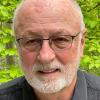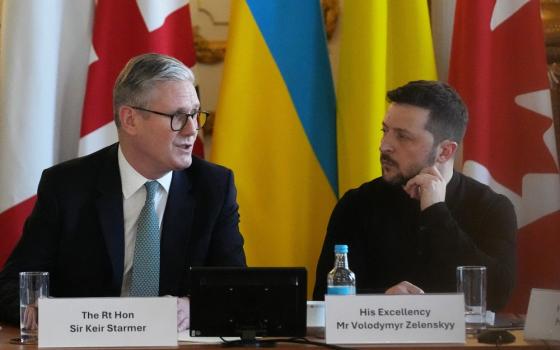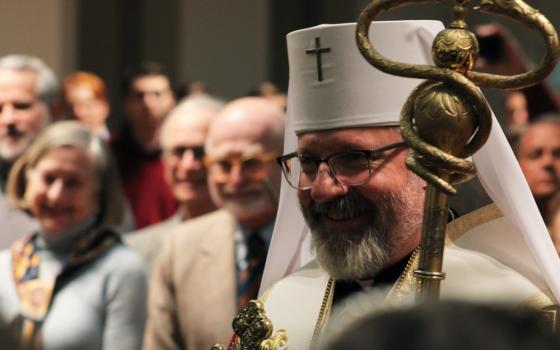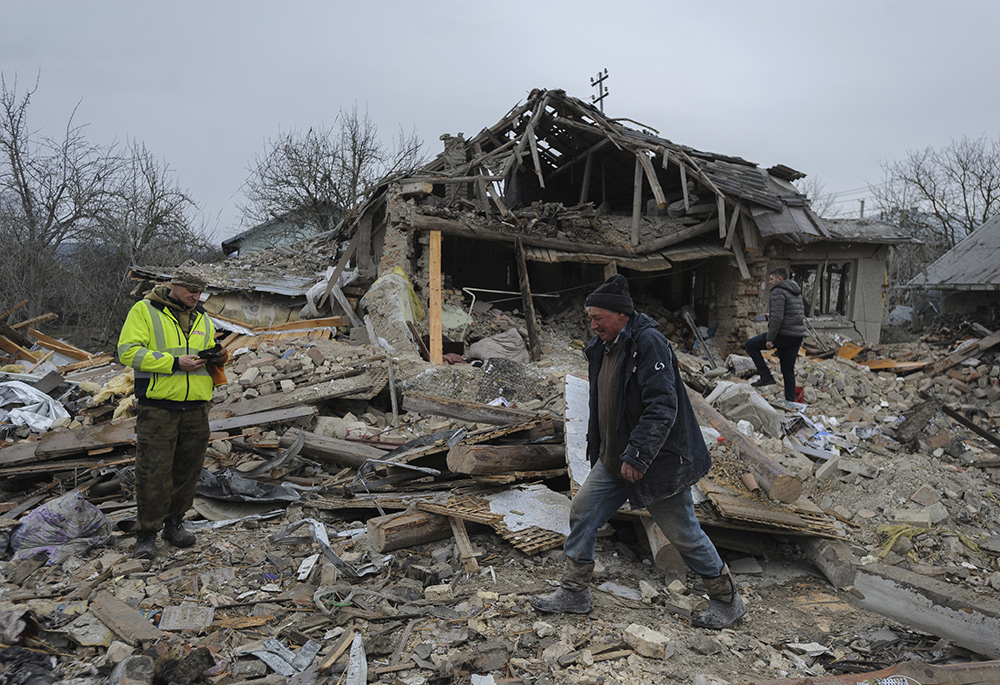
Villagers walk in the debris of private houses ruined in Russia's night rocket attack in a village, in Zolochevsky district in the Lviv region, Ukraine, March 9. NCR board member David Bonior and contributor Fr. Peter Daly traveled to Ukraine and Poland in March. (AP photo/Mykola Tys)
Editor's note: NCR board member David Bonior and contributor Fr. Peter Daly traveled to Ukraine and Poland in March. This is the first report from that trip.
Poles and Ukrainians are tough, smart and resilient. In many ways they have emulated their leaders, former Polish President Lech Walesa, Pope John Paul II and now Ukrainian President Volodymyr Zelenskyy. To beat the Russians requires courage and stamina. Walesa and John Paul led the charge in Europe to defeat a suffocating communism. Zelenskyy is doing the same against a brutish expansionist government in Russia.
In Ukraine, I found an abundance of brave and determined Ukrainians, and in Poland I discovered kind and generous Samaritans who opened their arms and homes to their beleaguered neighbors.
I was raised by Polish and Ukrainian parents and grandparents in Detroit. We took our religion, our government and our labor unions seriously. We were baptized into the Catholic Church. When we were old enough to vote we joined the Democratic Party.
At work, we treasured our union solidarity. We fought in wars to protect our nation and our democracy. And if our neighbor needed support and comfort, we were there for them. In Poland and Ukraine, time and again we met people who exhibited and cherished those same characteristics and values.
I traveled with Fr. Peter Daly, who is also a lawyer. Accompanying us was Dr. Jim McDermott, a psychiatrist and 28-year veteran of the U.S. House of Representatives, and his friend Tanya Keppler, who worked in the technology sector.
After a morning of productive meetings and visits by our gracious hosts in the Ukrainian Catholic Archeparchy of Ivano-Frankivsk, in western Ukraine, we lunched with the archbishop and then drove 90 minutes in light falling snow to the archeparchy retreat house in the mountains.
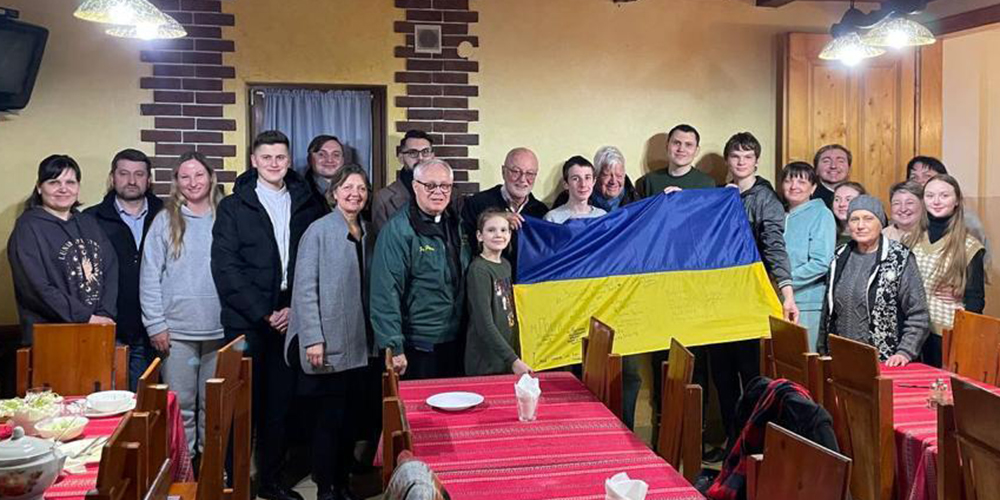
Refugees at the Catholic retreat house in the Carpathian Mountains in Ukraine are pictured with visitors from the U.S., including NCR contributor Fr. Peter Daly, front row, sixth from the left, NCR board member David Bonior, holding the flag, and Jim McDermott, to his left. Refugees signed and presented a Ukrainian flag to the delegation. (Courtesy of David Bonior)
Up ahead we could see the three-story log cabin where 39 Ukrainian displaced persons have migrated from all parts of the country. Each had a compelling and heart-rending story. Up on the third floor beneath the pitched roof is the chapel where we gathered to hear them.
We sat in an oval facing each other, 20 or so refugees and our delegation. There are several teenagers, including 16-year-old Constantine* who had arrived from Kherson with his mother and their cat named Massa. In November of 2022, after their house was bombed by the Russian military, they traveled through Mykolaiv and Odessa before arriving in Ivano-Frankivsk and then to the retreat house in the mountains.
Constantine is a tall, lanky young man with a serious demeanor that belies his young age. I watched him as other refugees painfully unveiled their tragic stories of dispossession, torture and death. He listened intently, respecting their stories and pain. After all, they are now his family. I was taken by his maturity. Later he showed me on his phone the shelling that destroyed his home and the fire that raged through it.
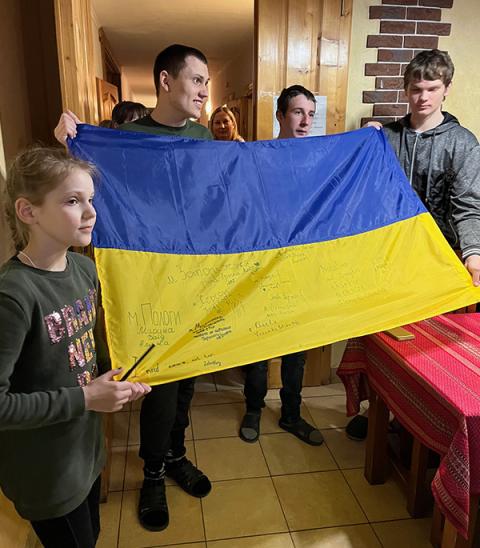
Young refugees, including Constantine on the right, present a Ukrainian flag that they had signed for David Bonior and the delegation, for coming and bearing witness, and being representatives of the U.S., at a retreat house in western Ukraine. (Courtesy of David Bonior)
His grandmother died because of a lack of medication. When Constantine visited her grave near a checkpoint, the Russians threatened to take him into their army. He said he managed to escape death, when a mine exploded in a food market just 20 meters from him. At night through his window he heard the terror of torture as the Russians murdered civilians suspected of siding with Ukraine. He said the screaming from torture and people begging the Russians to spare their lives haunts him. When the Russians approached Constantine or interrogated him, he could feel the fears inside him. He said the opposite was true when he was near a Ukrainian soldier — he felt pride and protected. Safe.
Later I asked Constantine what he wanted to do with his young life. He did not hesitate and said he will join the army. Before we left the retreat, Constantine and the other children signed a Ukrainian flag and presented it to us for coming and bearing witness and being representatives of the U.S., their steadfast ally in their fight for survival. Tears wet my cheeks as I accepted their gift and thought about how Constantine and the others see themselves as fighting not only for Ukraine but for those in democracies striving to remain free and strong.
Advertisement
As Constantine spoke in a measured way and in a serious tone, I watched his mother, her eyes proud of her son who was leaving his childhood behind and growing into a brave young man. Was she worried about his desire to fight in the army for Ukraine? Was she pulled by the pride she felt for her son and fearful that an artillery shell or a mine explosion would take it all away?
As I listened to Constantine and the others tell their stories I could feel the community that they created for each other, how their fate drew them together, bonded by the terrible scars of war and their determination to survive. It reminded me of John Steinbeck's The Grapes of Wrath:
And because they were lonely and perplexed, because they had all come from a place of sadness and worry and defeat, and because they were all going to a mysterious place, they huddled together; they talked together; they shared their lives, their food, and the things they hoped for in the new country. … In the evening a strange thing happened. The twenty families became one family, the children were the children of all. The loss of home became one loss, and the golden time in the West was one dream.
The next day, back at the Ukrainian Catholic University, our four-person team was scheduled to visit a philology class, the study of language in oral and written historical sources. The professor was a friend from Michigan, Bob Wood. The student body was predominantly young and female, not much older than Constantine. The absent young men were now in military service. All 20 of us answered a blaring air raid siren by cramming into a small room in the basement of a campus building. We were bearing witness in a bomb shelter.
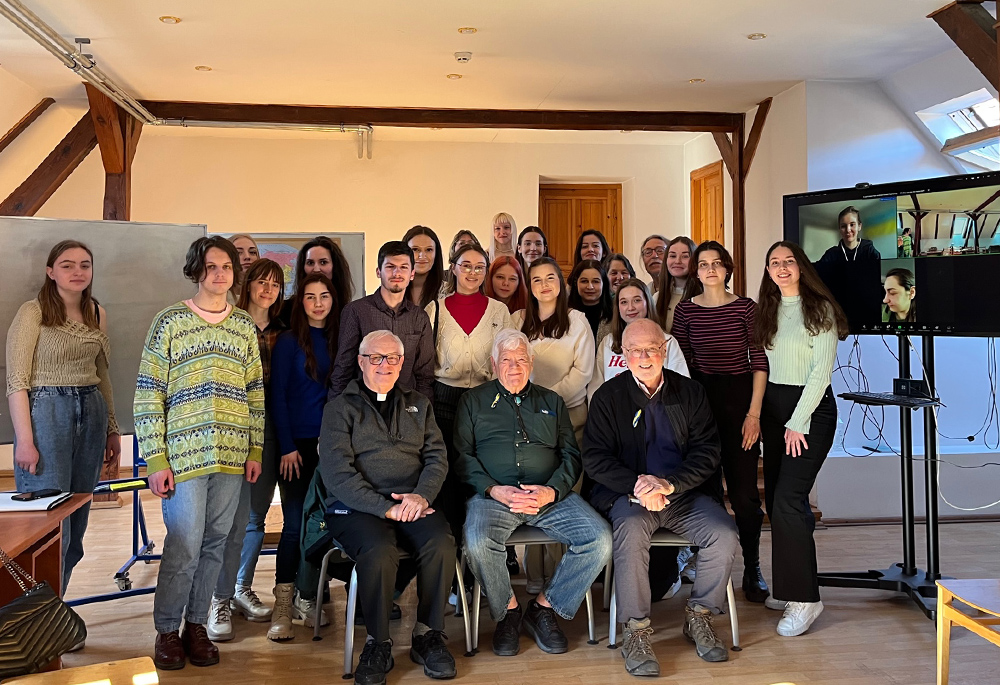
A class of sociology and social work majors is pictured at the Ukrainian Catholic University in Lviv. Seated in front is NCR contributor Fr. Peter Daly; Jim McDermott; and NCR board member David Bonior, who were visiting Ukraine and Poland. Professor Bob Wood is fourth from the right, back row. The monitor on the right shows a student in fatigues who is a medic with her unit in Bakhmut. (Courtesy of David Bonior)
In another of Bob's classes, a classmate joined us remotely on her phone dressed in her military fatigues from an outdoor location at the front in Bakhmut, the site of heavy fighting. She was a medic. It was surreal watching her participate in class while combat raged nearby.
With precision, each student in our improvised classroom took an equal amount of time to tell their own story, each filled with the emotions that the war underscored. As the students spoke, it became apparent that these young scholars exhibited the same kind of grit and smarts, characteristics of the men and women on the front lines.
Yana, a student with a boyfriend on the front, told us, "The best people in our country are dying. When we lose our best people, we will be ready to become the best people."
Katarina is a student who will be going to Zaporizhzhia to help. "We have bravery and we have evil, we should not let evil win. Another student chimed in, "Being Ukrainian is about freedom supporting the truth."
The themes the students spoke were accusatory of the Russians but were also uplifting and confident: "We will win!" "We are proud of our heritage." "This war has highlighted our national character."
All 20 of us answered a blaring air raid siren by cramming into a small room in the basement of a campus building. We were bearing witness in a bomb shelter.
The students see a bright future for their country and are resolved to build a better Ukraine. Many are working to raise funds for the needs of the soldiers — night goggles, drones and ambulances.
Sophia, another student, emphasized, "We are ready. Our generation was brought up in Ukrainian wisdom. Why does Russia bring war? We have a feeling of responsibility for the future. We are securing our own identity now."
Christina remembers the first day of the war in February 2022. "The whole night I was imagining the Russian tanks driving around my city which is in the far west of Ukraine." Then she said she realized the fear, strengths and emotions of the people of Bucha and the people in the south of Ukraine where the war was raging and innocent people were dying. Christina started to sob. "Children killed, women raped — such things!" Gaining her composure, she paused and then added, "But we are strong and we will stop this evil."
Many of the students shared a disgust for the Russians and their war crimes, saying that they see this not only as Putin's war, but as a war of all Russians.
We would later learn that on this very day the International Criminal Court overseeing war crimes charged Russian President Vladimir Putin and Russian official Maria Lvova-Belova of kidnapping Ukrainian children.
Fr. Mark Morozowich, a Ukrainian-American and dean of the School of Theology and Religious Studies at Catholic University in Washington, asked me a few weeks before our trip to Ukraine, "Who has given Ukrainians their national identity?"
I answered that it was President Zelenskyy.
Looking at me hard like one of my old seminary teachers, he said, "Putin."
His answer may have been better than mine. But we both may have been a little off the mark. Yes, both historical figures have played a prominent role in elevating Ukraine in the eyes of the Ukrainians but also the rest of the world that believes in freedom and democracy. But it was the Ukrainian people who with pride and resolve are fighting not only for themselves, but for us as well.
*Editor's note: Most of the Ukrainians who spoke to Bonior for this article asked that their last names not be used to protect their safety.
